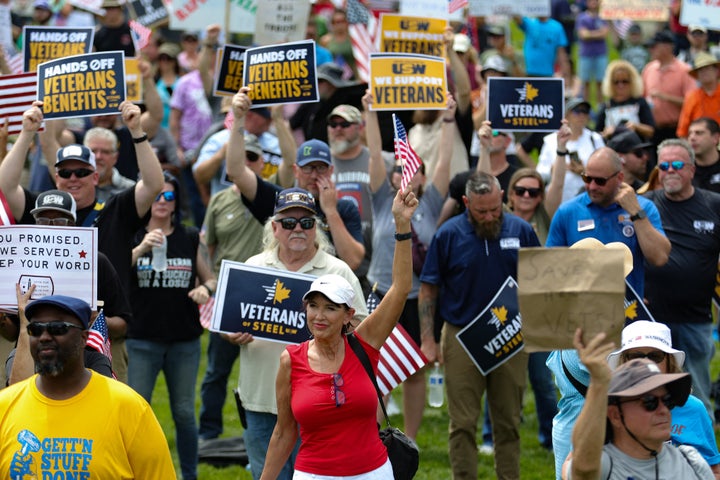🔴 Website 👉 https://u-s-news.com/
Telegram 👉 https://t.me/usnewscom_channel
When the Trump administration fired 2,000 probationary employees at the Department of Veterans Affairs earlier this year, frontline health care workers were spared from the president’s cuts. But Ann Marie Patterson-Powell said she and other VA nurses still felt the effects of the layoffs.
Medical supplies became harder to track down in her oncology unit at the VA hospital in Durham, North Carolina, Patterson-Powell said. So she ended up going floor to floor looking for blood-pressure cuffs, urinals, alcohol swabs and gauze. Nurses also had to help deliver meal trays to patients’ rooms, something normally done by the food service team, she said.
Patterson-Powell was still there doing her job — she was just doing other tasks, too.
“It took time away from our patient care,” said Patterson-Powell, a VA nurse for 16 years who is also a union representative. “The time that I could be passing out meds or doing some type of assessment, or any type of treatment with my patient, I’m having to pass out [food] trays because the person who usually does it is no longer available.”
“When you lay off support staff, our jobs get harder,” she said.
Most of the fired probationary workers have returned to their jobs, at least temporarily, thanks to a court order in March. The VA didn’t respond to questions from HuffPost about those layoffs — including whether workers on the supplies and food service teams in Durham were among them — or any upcoming ones.
But further cuts loom at the VA and other federal agencies, with the Trump administration putting together “reduction-in-force” plans and many workers opting to resign. The VA, which provides health care and benefits to millions of veterans, could cut around 80,000 of its roughly 470,000 employees in the mass layoff, according to an agency memo from March.
“You can’t cut 80,000 staff and not cut care.”
– Irma Westmoreland, VA nurse and union leader
Trump’s VA secretary, former GOP Congressman Doug Collins, has tried to offer assurances that “mission critical” staff like doctors and registered nurses won’t be hit with layoffs, and therefore patient care won’t deteriorate. But those who witnessed the initial firings — and the subsequent resignations, as some workers seek more secure jobs — said there’s no way to maintain the same level of care with fewer bodies.
“We know it’s going to affect our patients, and he [Collins] is sitting here saying that it’s not,” said Irma Westmoreland, a nurse at the Norwood VA Medical Center in Augusta, Georgia. “We know it’s going to affect all of us. You can’t cut 80,000 staff and not cut care and not cut benefits.”
Like Patterson-Powell and other VA nurses quoted in this story, Westmoreland is also an official with National Nurses United, a union that represents nurses at several VA facilities, and was only comfortable speaking on the record due to her union protections.
If layoffs come to VA health care facilities, nurses could end up squeezed due to the nature of their jobs. They are the point of contact who patients and families often turn to first when they need just about anything, whether it’s medication, an update from the doctor’s notes, a trip to the bathroom or a warm blanket. The VA is the largest employer of nurses and nursing assistants in the country, with 120,000 on its rolls. Around 1 in 8 of the agency’s nurses are veterans themselves.
Robert Malosh, a VA biomedical engineer and the president of his local union, said some workers are already having to pick up extra duties due to the administration’s “deferred resignation program,” in which employees could resign and still be paid through September. His union represents smaller satellite clinics in Michigan, where he said they lost 18 workers who chose to take what was billed as a “buyout.”
“Paying people to not work — we don’t understand it,” said Malosh, whose union, American Federation of Government Employees Local 2092, represents around 3,000 workers.
In interviews, VA nurses said many of their coworkers are considering leaving the federal government to work for private providers. Doctors and nurses were generally not eligible for the deferred resignation program, but some are still considering exiting now because of low morale and the expectation their jobs will only get harder.
Beverly Simpson, an infection control nurse, said she took a pay cut 11 years ago to leave a private hospital system and come to the VA center in Martinsburg, West Virginia, the same hospital she accompanied her stepfather to when she was a child. She felt drawn by the job security, the strong retirement benefits and the guarantee of well-funded care for patients — all of which now seem in jeopardy.
“It used to be the goal, because it was just excellent as a nurse to work for the VA,” Simpson said. “That’s completely changed. You’re under so much stress with all these executive orders, not knowing if your coworkers will be here tomorrow.”
BRYAN DOZIER via Getty Images
One of the orders President Donald Trump signed aims to end collective bargaining rights for up to a million federal workers under the shaky legal justification of “national security.” The order covers VA nurses even though they serve no real national security function, at least that they know of.
“What do I have to do with national security?” Patterson-Powell said. “I take care of my patients. They come in, they need chemotherapy, I make sure they get it. … Is that national security? It doesn’t feel that way to me.”
A federal judge initially blocked the policy from taking effect, but an appeals court later allowed the administration to move forward with it as the underlying lawsuit is litigated. If the administration succeeds in having union contracts thrown out, it would become much easier to fire federal employees without due process.
Simpson warned it would ultimately degrade VA health care by preventing nurses from speaking up in patients’ interest.
Heather Fallon, an emergency room nurse at a VA hospital outside Chicago, said she came to the VA two years ago in large part because of the agency’s resources.
“These cuts have already happened in the private sector. That’s why a lot of us have ended up at VA,” said Fallon, who’s been a nurse for 19 years. “It is a coveted place to work. And if we’re losing those benefits… losing the ability to safely care for our patients … then people aren’t going to work there the way they’ve wanted to in the past.”
Employees across the VA are concerned about the agency’s ability to attract new workers in the current climate.
“These cuts have already happened in the private sector. That’s why a lot of us have ended up at VA.”
– Heather Fallon, VA nurse and union official
One VA surgeon said it has “always been a bit difficult” to entice surgeons to come to the agency since many can earn more in private practice. Few promising young doctors would want to start a career at the VA under the Trump-era confusion and uncertainty, he said. He is relieved he only works at the agency part time.
“I could always pivot to my private practice, but I would feel a lot of existential dread if I was full time at the VA,” said the surgeon, who asked to speak anonymously for fear of retaliation. “What it feels like is that, without saying this, this is all an attempt to merely degrade the VA until it ceases to exist. … It is difficult to picture a future in which the VA thrives.”
A VA social worker said they probably would have quit already if they weren’t so worried about two particular veterans in their caseload.
“I’ve got to be honest — I already have a pension and a good bit of money in [the thrift savings plan],” they said, referring to the government retirement plan. “I’ve been looking. I put my resume out. I’m thinking about maybe looking for a counseling job at a university.”
The VA is paying the government’s human resources office more than $700,000 to help plan the agency’s reduction in force, according to reports. The layoffs are blocked for now, but the administration could move ahead with them quickly if a court order is lifted. Even if a lengthy court battle follows, many workers are likely to move on to new jobs or retirement before the case is resolved.
And those who survive the cuts might not stick around as long as they’d planned.
Patterson-Powell, who is 61, said she would probably quit now if she had 20 years of service, but she still has four to go before she can collect an immediate retirement benefit.
“We love what we do, and we want to make sure our veterans get the best care that’s possible,” she said. “For folks like me who did not serve in the military, this is my chance to give back. This is my service to those who served. I know I’m committed to doing that, but right now it’s hard.”

